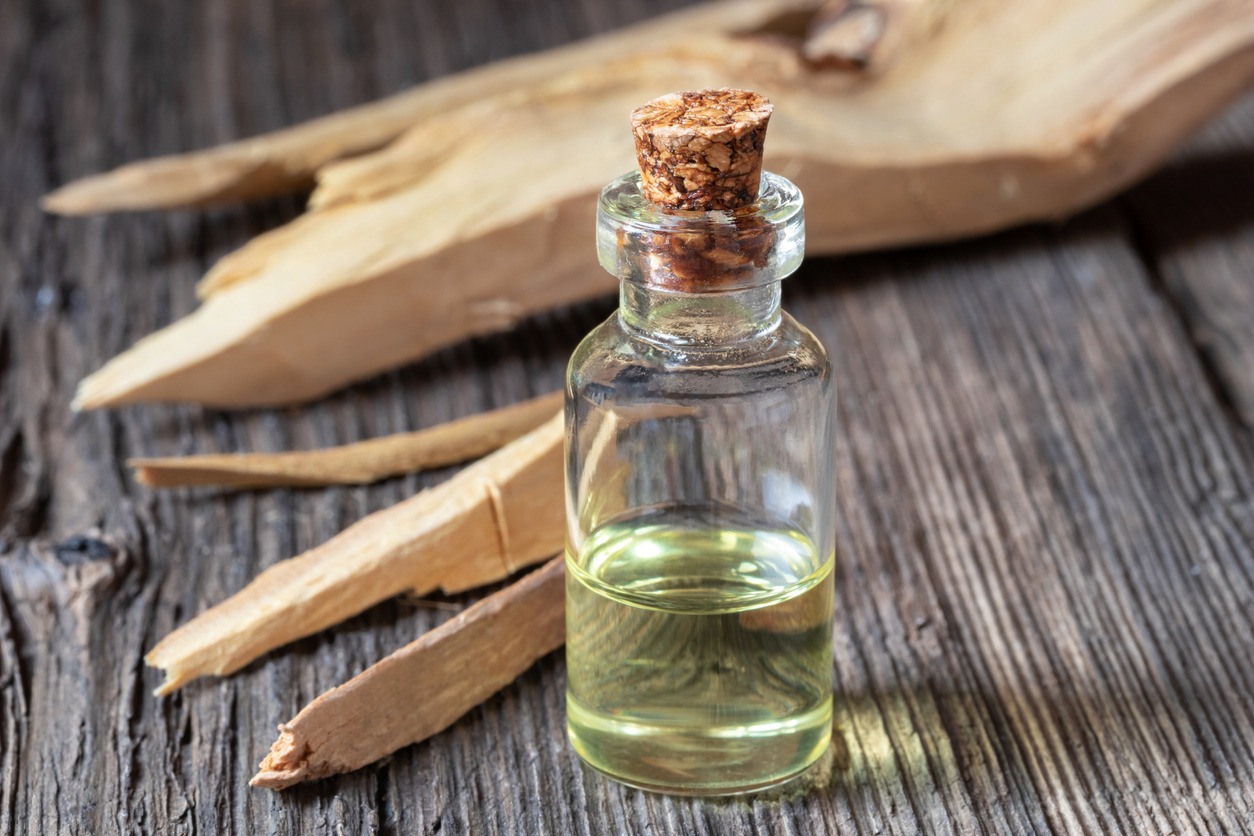Sandalwood essential oil comes from the heartwood of the sandalwood tree, which is among the oldest known materials used for its exotic scent.
It has offered a multitude of traditional uses in Ayurvedic and traditional Chinese medicine for centuries. Popularly used in cultural and spiritual ceremonies, sandalwood is treasured in Greece, Rome, and Egypt. It was used in embalming while the wood was made into caskets and furniture. It was also a fixture in ceremonies involving incense in India, China, and Japan, both in Hindu and Buddhist ceremonies. Besides incense, sandalwood is also used as a soft wooden material for carvings and beads.
Sandalwood oil has now found its way into perfumes and other personal care products, but it was used previously in Ayurvedic medicine to treat wounds, skin conditions, and leprosy. It’s also used in Chinese and Egyptian medicine for the same purposes. Buddhists later used it with cloves and aloeswood as the incense used in Buddhist ceremonies, especially those related to death.
Benefits of Sandalwood Essential Oil
Sandalwood has become a part of local folk medicinal traditions in places where sandalwood is a native plant. It’s often used to treat aches and wounds, and it’s used for cleaning oneself. Common conditions that folk medicine has treated with sandalwood include scabies, hemorrhoids, colds, urinary tract infections, muscle problems, and issues in the liver and gallbladder.
While there isn’t much modern scientific research to back up these claims, there have been a lot of scientific studies or clinical trials in sandalwood.
One of the most common modern applications of sandalwood is aromatherapy, which is used to treat stress and anxiety. While aromatherapy doesn’t work for everyone, it can be effective for people who are receptive to the treatment. Sandalwood oil is no exception to this. A 2006 study in Complementary Therapies in Clinical Practice revealed that sandalwood oil, when used in aromatherapy, can help reduce anxiety. Another study in Planta Medica found that aromatherapy using sandalwood resulted in to increase in perspiration and blood pressure, which indicates an increase in alertness.
Sandalwood is also known for its use in skincare products. This application is backed by science, as previous studies published in the Journal of Cranio-Maxillofacial Surgery showed that sandalwood has astringent, antimicrobial, and antibacterial properties.
The potential of sandalwood oil as a wound-healing agent has also been studied. A 2014 study published in the Journal of Investigative Dermatology showed that skin cells have olfactory receptors that can detect and accept sandalwood oil. When they do this, it might spur the growth of skin cells. Another study in the Archives of Biochemistry and Biophysics revealed that sandalwood oil has the potential to fight skin cancer, while other studies indicate that it may help obliterate cancerous cells.
Benefits of Sandalwood Oil for Hair
While sandalwood oil can offer many health benefits, it can also be a great remedy for your hair concerns and benefit your overall hair and scalp health. Here are some benefits you can get by using sandalwood oil for your hair.
1. It can stimulate hair growth.
You may not know this, but sandalwood oil is one of the natural agents you can use to combat hair loss. If you want to encourage faster hair growth, you can try using sandalwood oil.
A study published in the journal Nature Communications suggests that sandalwood oil effectively stimulates hair growth. Their lab tests showed that rubbing sandalwood oil on scalp tissues showed hair growth just after six weeks. The German researchers exposed scalp tissues to Sandalore, an artificial sandalwood-like aroma, and six days after exposure, keratin in the scalp tissue began to increase. This concludes that sandalwood oil helps block the genes that cause the self-destruction of keratin cells.
Previous studies have shown that exposure to sandalwood can induce the multiplication of keratin in human skin cells. Not only does it prove that sandalwood oil can help speed up healing, but it also paved the way for research on sandalwood-based treatments for hair loss.
2. It has anti-inflammatory benefits.
To grow healthy hair, you must first have a healthy scalp. Sandalwood oil’s anti-inflammatory properties can help soothe your scalp and remove rough patches. Suppose you have skin conditions like dandruff, acne, eczema, or psoriasis on your scalp and the skin around it. In that case, sandalwood oil can help reduce the redness and inflammation that is common with these conditions.
3. It’s a natural antiseptic.
Bacterial infection can pose a danger to your hair health, as it can cause dandruff and even hair loss and baldness. Applying some sandalwood oil to your scalp can help it act as a preemptive antimicrobial agent that can fight bacteria-induced dandruff.
4. It helps moisturize dry skin.
If your hair is dry, it can be frizzy or even start to break off, causing it to appear unkempt and unruly. This is why you would want a moisturizing agent to help keep your hair looking healthy and shiny.
If you can spare some extra time, try applying sandalwood oil directly on your scalp, then drape a microfiber towel over your head for 30 minutes. This can help promote blood circulation in the scalp and help with dryness. You can rinse off or wash off excess oils after. But since sandalwood essential oils can be potent, it’s essential to dilute it first with a carrier oil before applying it to the scalp. You may also opt to use sandalwood hair massage oil, which is formulated for use on the scalp.
5. It can help fight acne.
Acne on the scalp is an indication that you have a problem, plus it can be very painful when you try to comb or brush your hair if you get acne on the scalp. Sandalwood oil can help manage the oil content of your hair and scalp to prevent acne or help get rid of it without drying out your scalp.
But if you have sensitive skin, it’s important to do a patch test first with the oil before applying it all over your scalp or face.
6. It has a sweet, woody fragrance.
One of the main qualities for which sandalwood is known is its sweet and woody aroma. No one likes hair and scalp that smells, right. Sandalwood oil is an aromatic oil that can make your hair smell good while also stimulating your senses, enhancing your mood, and creating a calming effect.


